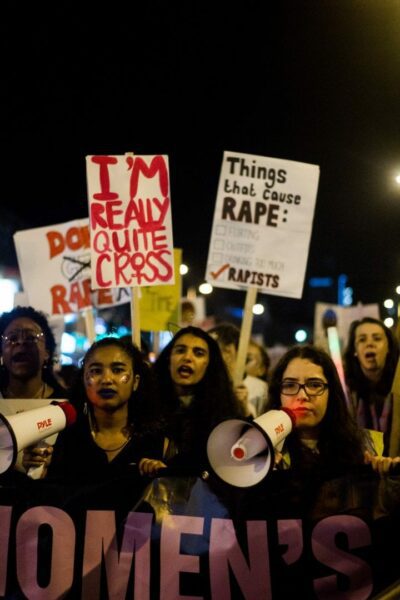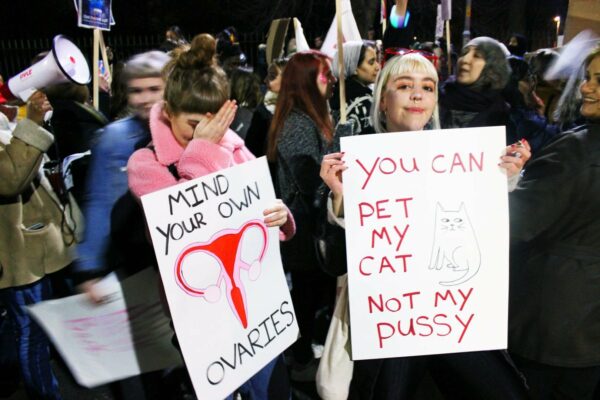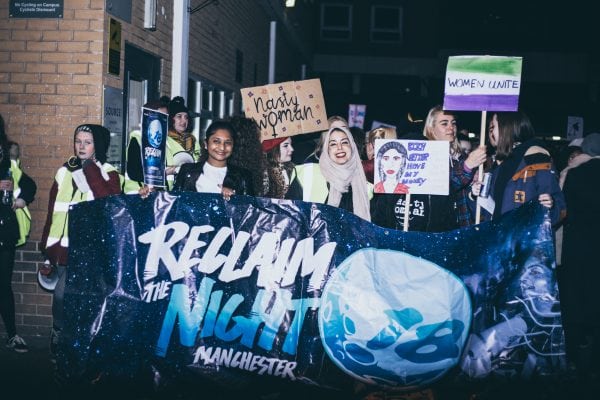
Following the deeply unsettling case of Reynhard Sinaga, who was convicted in Manchester Crown Court earlier this month of 136 counts of rape, I sat down with SU Women’s Officer Ayla Huseyinoglu to discuss the annual Reclaim the Night campaign and male inclusion in the wider conversation about sexual assault.
In the face of atrocities such as those committed by Sinaga, events like Reclaim the Night are a powerful and moving declaration of defiance by both survivors and allies.
As Women’s Officer, Ayla is key in the planning and implementation of Reclaim the Night 2020, which she describes as, “a campaign against sexual assault and gender-based violence,” which has at its heart a march from Owens Park to the Students’ Union, taking place on the 20th of February.
It must be noted that the conversation surrounding sexual assault is quite often set up in a binary of cis female victims and cis male perpetrators. This could be said to disclude not only trans and nonbinary people from the conversation, but also male victims.
Ayla acknowledged that Reclaim the Night has historically been women-focused and expressed a belief that it is “important that we keep the focus on women and non-binary people, who are more likely to experience sexual violence.” However, she then raised the point that it is “also important that we recognise that sometimes sexual assaults can and do happen to men as well.”

In order to make the march as inclusive as possible, Ayla explained that this year’s planning committee have opted for a block “for each of the liberation groups”. These include designated blocks in the march women, BAME people, trans people, and members of the LGBTQI+ community. The final block of the march is mixed meaning people of all genders, backgrounds and sexualities are welcome to march together in this section, men most certainly included.
Male inclusion in the conversation around sexual assault – and in events such as Reclaim the Night – could, however, be seen as rather a complex issue. Statistics show that women are overwhelmingly more likely to be victims of sexual assault than men – according to Rape Crisis UK, approximately 85,000 women and 12,000 men (aged 16 – 59) experience some form of sexual assault in England and Wales annually. Alongside this, it is estimated that around 90% of perpetrators of sexual abuse are men.
Yet, in answer to the question of whether there is a possibility that women, trans and non-binary people, who are survivors of sexual assault the hands of men, may feel uncomfortable with an increased male presence at Reclaim the Night, Ayla stressed that men have never been unwelcome at the event.
“I think it’s always been important that men and people of all genders are included in conversations about sexual violence because if not everyone is involved in the conversations then [sexual violence] is not going to end.”

Prior to this interview, The Mancunion approached male students at the University of Manchester to ask them their thoughts on male inclusion in Reclaim the Night events. One student explained that he chose not to attended Reclaim the Night in the past, due to concern that he would be “intruding on a protest for those who feel unsafe at night due to fear of sexual assault.
“Even in the wake of the breaking of the serial rapist story in Manchester, I don’t think I am one of these people, so would still feel as though I would be intruding.”
Despite the hesitation some may have about getting involved, the Reclaim the Night march has grown in recent years from 1000 participants in 2018 to 3,500 in 2019. Ayla expressed a hope that this is because the stigma associated with talking about sexual assault is fading, meaning not only do increasingly more people feel empowered to come forward as victims, but others are also stepping up as allies:
“I think it’s really healthy that we’re talking about it more but it definitely still happens – there are still statistics showing that there are survivors coming forward all the time.”
Alongside this growing awareness of the prevalence of sexual assault, there is an increasing acceptance of the fact that men can be victims too, and yet maybe aren’t as included in the discussion as other genders.
Ayla stated that “not enough is done for survivors no matter who they are, and I think there is a stigma associated with talking about sexual abuse in general. But I think when we’re talking about men it plays into men talking about mental health and issues around that in general that need to be broken down.”
One positive to come from the horrors of the Sinaga case is a recent surge in the national conversation surrounding male survivors and survivors of all genders. This may help to alleviate some of the shame some people associate with being a victim of such an attack and may help educate people on how to get help.

Reclaim the Night also does a lot to raise support for a number of organisations that help victims of sexual abuse:
“We raise money for charity through the sale of t-shirts that we make for Reclaim the Night and some of that money is going to go towards Survivors Manchester, which is a charity for male survivors. We are also going to have some of the money going to Rape Crisis, which helps women survivors, and an LGBTQ charity as well.”
“If we do want to change this culture, in which sexual assaults and sexual violence still happen, I think that everyone needs to be in the discussions both from their own experiences and in solidarity with people who are survivors themselves”
The Reclaim the Night march will be taking place on Saturday 20th February, beginning at Owens Park campus in Fallowfield and ending at the University of Manchester Students’ Union.
If you would like to support the event as a volunteer, you can sign up for roles on the Volunteer hub. Opportunities are available for stewarding and helping run banner-making sessions. Alongside this, a call is being put out to any feminist artists, crafters and jewellery makers who would like to run a stall at the charity fair taking place in the Students’ Union after the march.
If you have been affected by the issues covered in this article or wish to report an incident, please contact the Students’ Union advice service, visit the University’s Report and Support platform or contact one of the following charities:







